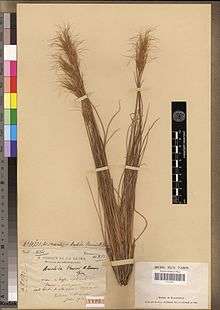Sartidia
| Sartidia | |
|---|---|
 | |
| only known specimen of Sartidia perrieri | |
| Scientific classification | |
| Kingdom: | Plantae |
| Clade: | Angiosperms |
| Clade: | Monocots |
| Clade: | Commelinids |
| Order: | Poales |
| Family: | Poaceae |
| Subfamily: | Aristidoideae |
| Tribe: | Aristideae |
| Genus: | Sartidia De Winter |
| Type species | |
| Sartidia angolensis (C.E.Hubb.) De Winter[1] | |
| Species | |
|
Six species, see text | |
Sartidia is a genus of Southern African and Madagascan plants in the grass family. It was split from Aristida in 1963 by South African botanist Bernard de Winter[1] and contains six known species, of which Sartidia perrieri is considered extinct.[2] Other than most species in subfamily Aristidoideae, Sartidia species use the ancestral C3 photosynthetic pathway. Their natural habitats are warm, semi-arid savanna and dry forest at altitudes of 800–2,000 metres (2,600–6,600 ft) where rainfall ranges from 250 to 1,500 mm per year.[2] They are perennial grasses with inflorescence in a panicle.[3]
- Sartidia angolensis (C.E.Hubb.) De Winter – Angola, Zambia, Zimbabwe, Namibia
- Sartidia dewinteri Munday & Fish – Mpumalanga (South Africa), Swaziland
- Sartidia isaloensis Voronts., Razanatsoa & Besnard – Madagascar
- Sartidia jucunda (Schweick.) De Winter – Limpopo (South Africa)
- Sartidia perrieri (A.Camus) Bourreil – Madagascar (extinct)
- Sartidia vanderystii (De Wild.) De Winter – Democratic Republic of the Congo
References
- 1 2 De Winter, B. (1963). "Notes on the genus Aristida". Kirkia. 3: 132–137. JSTOR 23500816.
- 1 2 3 Vorontsova, M.S.; Haevermans, T.; Haevermans, A.; Razanatsoa, J.; Lundgren, M.R.; Besnard, G. (2015). "The Genus Sartidia (Poaceae: Aristidoideae) in Madagascar". Systematic Botany. 40 (2): 448–453. doi:10.1600/036364415X688367. ISSN 0363-6445.
- ↑ RBG Kew: GrassBase - Sartidia description
- ↑ Tropicos – Sartidia De Winter
External links
| External identifiers for Sartidia | |
|---|---|
| Encyclopedia of Life | 5850674 |
| GBIF | 4118613 |
| NCBI | 348171 |
| eMonocot | 440210 |
| Also found in: Wikispecies, GrassBase, Tropicos, World Checklist of Selected Plant Families | |
This article is issued from Wikipedia - version of the 11/9/2016. The text is available under the Creative Commons Attribution/Share Alike but additional terms may apply for the media files.